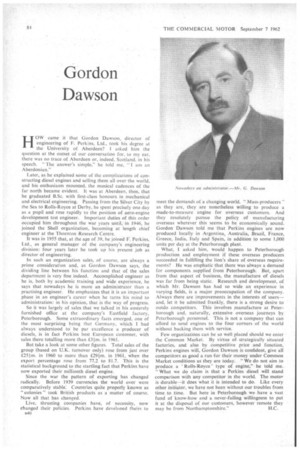Gordon Dawson
Page 86

If you've noticed an error in this article please click here to report it so we can fix it.
How came it that Gordon Dawson, director of engineering of F. Perkins, Ltd., took his degree at the University of Aberdeen? I asked him the question at the outset of our conversation for, to my ear, there was no trace of Aberdeen or, indeed, Scotland, in his speech. "The answer's simple," he told me, " I am an Aberdonian."
Later, as he explained some of the complications of constructing diesel engines and selling them all over the world, and his enthusiasm mounted, the musical cadences of the far north became evident. It was at Aberdeen, then, that he graduated B.Sc. with first-class honours in mechanical and electrical engineering. Passing from the Silver City by the Sea to Rolls-Royce at Derby, he spent precisely one day as a pupil and rose rapidly to the position of aero-engine development test engineer. Important duties of this order occupied him throughout the war years until, in 1946, he joined the Shell organization, becoming at length chief engineer at the Thornton Research Centre.
It was in 1955 that, at the age of 39, he joined F. Perkins, Ltd., as general manager of the company's engineering division: four years later he took up his present job as director of engineering.
In such an organization sales, of course, are always a prime consideration and, as Gordon Dawson says, the dividing line between his function and that of the sales department is very fine indeed. Accomplished engineer as he is, both by academic training and wide experience, he says that nowadays he is more an administrator than a practising engineer. He emphasizes that it is an important phase in an engineer's career when he turns his mind to administration: in his opinion, that is the way of progress.
So it was largely of sales that we talked in his austerely furnished office at the company's Eastfield factory, Peterborough. Some extraordinary facts emerged, one of the most surprising being that Germany, which I had always understood to be par excellence a producer of diesels, is in fact Perkins best European customer, with sales there totalling more than £31m. in 1961.
But take a look at some other figures. Total sales of the group (based on U.K. turnover only) rose from just over £251m. in 1960 to more than L291m. in 1961, when the export percentage rose from 77.2 to 81.7. This is the statistical background to the startling fact that Perkins have now exported their millionth diesel engine.
Since the war the pattern of exporting has changed radically. Before 1939 currencies the world over were comparatively stable: Countries quite properly known as " colonies " took British products as a matter of course. Now all that has changed.
Live, thrusting companies have, of necessity, now changed their policies. Perkins have develoned theirs to H40 meet the demands of a changing world. " Mass-producers " as they are, they are nonetheless willing to produce a made-to-measure engine for overseas customers. And they resolutely pursue the policy of manufacturing overseas wherever this seems to be economically sound. Gordon Dawson told me that Perkins engines are now produced locally in Argentina, Australia, Brazil, France, Greece, India, Italy and Spain, in addition to some 1,000 units per day at the Peterborough plant.
What, I asked him, would happen to Peterborough production and employment if these overseas producers succeeded in fulfilling the lion's share of overseas requirements? He was emphatic that there was always a demand for components supplied from Peterborough. But, apart from that aspect of business, the manufacture of diesels was far from being static. Research and development, of which Mr. Dawson has had so wide an experience in varying fields, is a major preoccupation of the company. Always there are improvements in the interests of users— and, let it be admitted frankly, there is a strong desire to outdo competitors. This involves manufacture at Peterborough and, naturally, extensive overseas journeys by Peterborough personnel. This is not a company that can afford to send engines to the four corners of the world without backing them with service.
Few organizations can be so well placed should we enter the Common Market. By virtue of. strategically situated factories, and also by competitive price and function, Perkins engines will, Gordon Dawson is confident, give all competitors as good a run for their money under Common Market conditions as they are today. "We do not aim to produce a Rolls-Royce' type of engine," he told me. "What we do claim is that a Perkins diesel will stand comparison with any competitor in the world. The motor is durable—it does what it is intended to do. Like every other initiator, we have not been without our troubles from time to time. But here in Peterborough we have a vast fund of know-how and a never-failing willingness to put it at the disposal of our customers, however remote they may be from Northamptonshire." H.C.








































































































































